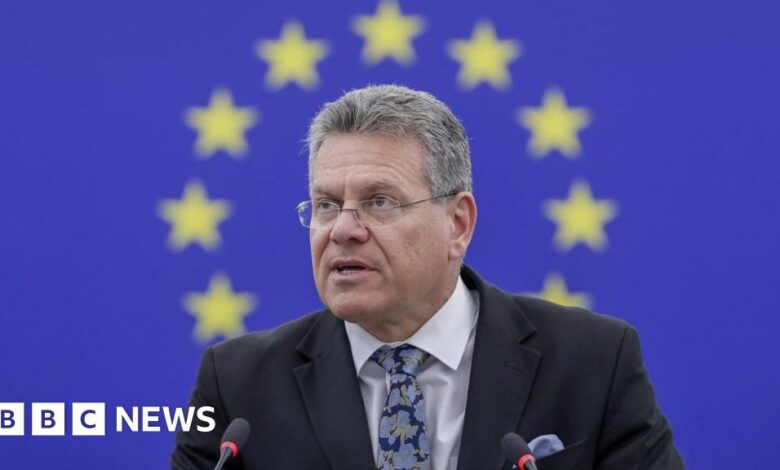EU calls for US trade deal based on ‘respect’ after Trump’s tariff threats

The European Union’s trade chief has emphasized the importance of securing a trade deal with the United States based on mutual respect rather than threats. In response to US President Donald Trump’s recent threat to impose a 50% tariff on all goods imported from the EU, EU Trade Commissioner Maros Sefcovic affirmed the bloc’s commitment to finding a mutually beneficial agreement.
During a call with US Trade Representative Jamieson Greer and Commerce Secretary Howard Lutnick, Sefcovic stated, “EU-US trade is unmatched and must be guided by mutual respect, not threats. We stand ready to defend our interests.” This statement comes as Trump expressed impatience with the progress of EU-US trade negotiations, declaring his intention to raise tariffs on June 1st.
Trump’s remarks on social media indicated a lack of progress in discussions with the EU, prompting him to assert that the deal had already been set. However, he did mention the possibility of a delay in tariffs in response to a significant investment in the US by a European company.
The European governments have cautioned against escalating tariffs, highlighting the potential damage to both sides. Leaders such as Ireland’s Taoiseach Micheál Martin, France’s Trade Minister Laurent Saint-Martin, and Germany’s Economy Minister Katherina Reiche emphasized the importance of negotiations and de-escalation in trade disputes.
While the EU negotiates with the US as a bloc, there are concerns that individual countries in Europe may seek separate agreements. Stephen Moore, a former economic advisor to Trump, suggested that the US aims to reduce global dependence on Chinese influence, which could impact trade negotiations with Europe.
Trump’s previous imposition of tariffs on various countries, including the EU, has strained trade relations. The EU threatened retaliatory measures against the US, but these have been temporarily suspended. Trump’s focus on reducing the trade deficit with Europe, particularly in the automotive and agricultural sectors, has fueled tensions.
In addition to trade disputes with Europe, Trump’s warnings about imposing import taxes on smartphones not manufactured in America have rattled markets. Both US and EU stock markets experienced declines following the latest trade threats, underscoring the economic impact of trade tensions.
As negotiations continue between the EU and the US, finding a balanced and fair trade agreement remains crucial for both parties. Mutual respect, open dialogue, and a commitment to resolving differences through negotiations will be key to achieving a sustainable trade relationship.





